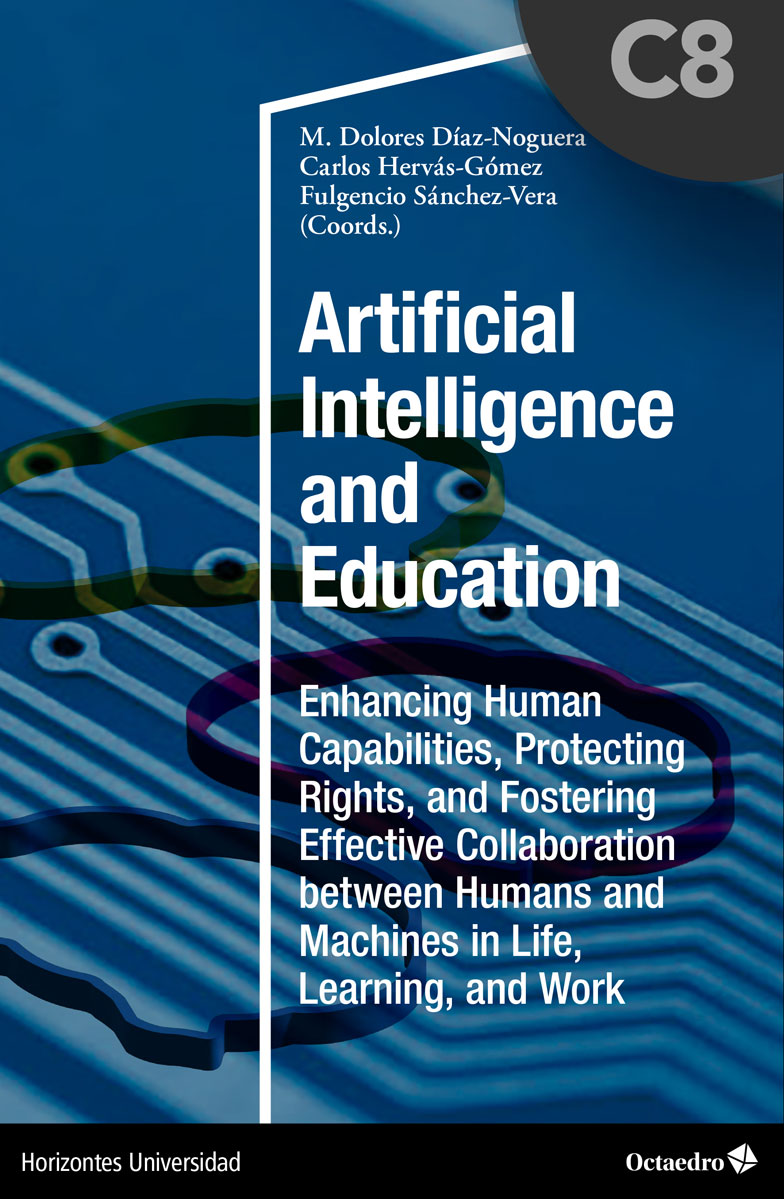FICHA TÉCNICA
Fecha de publicación:
06/11/2024
Doi del capítulo:
Título del libro: Artificial Intelligence and Education
URL del libro:
ISBN del libro: 9788410282452
DOI del libro:
Abstract
One of the most important sociological phenomena in the current panorama is Artificial Intelligence (AI). In the near future, the application of this type of technology is expected to revolutionize different social sectors, such as health, marketing, industry, communication, etc. Inevitably, this will prompt changes in certain social structures. A recent response to this has been the outlining of the first European AI law, which will come into force in 2026 to regulate different social challenges. The educational sector will also need to adapt to face the social changes brought about by AI. In this chapter we focus on the potential and/or limitations that chatbots have for the educational community and how these are geared towards the self-regulation of learning. The application of these types of programmes, based on AI, is slowly being incorporated into the educational system as a very useful tool, but it also poses certain challenges to the system.
Palabras clave
Autores
PhD Marta Aguilar-Gil
Universidad de Sevilla, Spain
maguilar6@us.es
https://orcid.org/0000-0002-8038-3421
Cómo citar
Aguilar-Gil, M. (2024). Society and Artificial Intelligence: Chatbots in the Educational Process. In Díaz-Noguera, M. D., Hervás-Gómez, C., Sánchez-Vera, F. (Coords.), Artificial Intelligence and Education (pp. 127-144). Octaedro. https://doi.org/10.36006/09643-1-08
Referencias bibliográficas
«Arbeláez-Campillo, D., Villasmil, J., y Rojas-Bahamón, M. (2021). Inteligencia artificial y condición humana: ¿Entidades contrapuestas o fuerzas complementarias? Revista de Ciencias Sociales (Ve), XXVII (2), 502-513.
Bauman, Z. (1999). Modernidad líquida. Fondo de Cultura Económica.
Beck, U. (1998). La sociedad del riesgo. Hacia una nueva modernidad. Paidós.
Bell, D. (1976). El advenimiento de la sociedad posindustrial. Alianza.
Boden, M. (1984). Inteligencia artificial y hombre natural. Tecnos.
Capgemini Research Institute (2023). Digital skills and technology in secondary education survey. https://www.capgemini.com/es-es/wp-content/uploads/sites/16/2024/09/Final-Infographic-Digital-Skills-2.pdf
Castells, M. (1999). La era de la información: economía, sociedad y cultura. La sociedad red. Siglo XXI.
Collins, R. (2009). Perspectiva sociológica. Una introducción a la sociología no obvia. Universidad Nacional de Quilmes.
Dimitriadis, G. (2020). Evolution in education: chatbots. Homo Virtualis, 3(1), 47-54. https://ejournals.epublishing.ekt.gr/index.php/homvir/article/download/23456/19700
García, A. (1912). Inteligencia artificial: fundamentos, práctica y aplicaciones. RC Libros.
García-Brustenga, G., Fuertes-Alpiste, M., y Molas-Castells, N. (2018). Briefing paper: los chatbots en educación. Universitat Oberta de Catalunya. https://doi.org/10.7238/elc.chatbots.2018
Gobierno de España. (2024, February). Plan de Recuperación, transformación y resiliencia. https://planderecuperacion.gob.es/noticias/que-es-inteligencia-artificial-ia-prtr#:~:text=que%20posteriormente%20McCarthy%20definir%C3%ADa%20como,especialmente%20programas%20de%20computadora%20inteligentes%22
IPSOS (2023). Global Education Monitor. https://www.ipsos.com/sites/default/files/ct/news/documents/2023-09/Ipsos%20Global%20Education%20Monitor.pdf
Ley Orgánica 3/2020, de 29 de diciembre, por la que se modifica la Ley Orgánica 2/2006, de 3 de mayo, de Educación. Boletín Oficial del Estado, 340, de 30 de diciembre de 2020. https://www.boe.es/eli/es/lo/2020/12/29/3/con
McCarthy, J. et al. (1955). A Proposal for the Dartmouth Summer Research Project on Artificial Intelligence. https://www-formal.stanford.edu/jmc/history/dartmouth /dartmouth.html
McCulloch, W., & Pitts, W. (1943). A logical calculus of the ideas immanent in nervous activity. The Bulletin of Mathematical Biophysics, 5(4), 115-133. https://doi.org/10/djsbj6
Ministerio de Ciencia, Innovación y Universidades (2019). Estrategia española de I+D+I en inteligencia artificial. http://www.ciencia.gob.es/
Moreno, R. (2019). La llegada de la inteligencia artificial a la educación. Revista de Investigación en Tecnologías de la Información, 7(14).
Morín E. (January 28, 2024). La tecnología progresa, el pensamiento retrocede. El País. https://elpais.com/ideas/2024-01-28/la-tecnologia-progresa-el-pensamiento-retrocede.html?event_log=oklogin
Newell, A., &Simon, H. A. (1972). Human problema solving. Englewood Cliffs, Prentice-Hall.
Okonkwo, C. W., & Ade-Ibijola, A. (2021). Chatbots applications in education: A systematic review. Computers and Education: Artificial Intelligence, 2, 100033. https://doi.org/10.1016/j.caeai.2021.100033
Pertusa, J. (2023). Inteligencia artificial aplicada a la educación el futuro que viene. Supervisión21, 69, 1-28. https://doi.org/10.52149/sp21
Presidencia Española del Consejo de la UE (2023, 9 December). Ley de Inteligencia Artificial: el Consejo y el Parlamento llegan a un acuerdo sobre las primeras normas del mundo para la IA (comunicado de prensa). https://spanish-presidency.consilium.europa.eu/es/noticias/consejo-parlamento-acuerdo-primeras-normas-mundiales-inteligencia-artificial/
Ray Kurzweil, R. (2012). La Singularidad está cerca. Cuando los humanos transcendamos la biología. Lola Books.
Real Academia Española. (s.f.). Inteligencia artificial. En Diccionario de la lengua española. https://dle.rae.es/inteligencia#2DxmhCT
Turing, A. M., (1950), Computing machinery and intelligence. Mind, 50, 433-460.
UNESCO (2019). International Conference on Artifcial Intelligence and Education. Final Report. Planning Education in the AI Era: Lead the leap. https://unesdoc.unesco.org/ark:/48223/pf0000370967
UNESCO (2021). La inteligencia artificial y educación: guía para las personas a cargo de formular políticas. https://unesdoc.unesco.org/ark:/48223/pf0000379376
UNESCO (2023). La inteligencia artificial en la educación. https://www.unesco.org/es/digital-education/artificial-intelligence
Wollny, S., Schneider, J., Di Mitri, D., Weidlich, J., Rittberger, M., y Drachsler, H. (2021). Are we there yet? A Systematic literature review on chatbots in education. Frontiers in Artificial Intelligence, 4, 654924. https://doi.org/10.3389/frai.2021.654924
Zimmerman, BJ (2008). Investigating Self-Regulation and Motivation: Historical Background, Methodological Developments, and Future Prospects. American Educational Research Journal, 45, 166-1»
